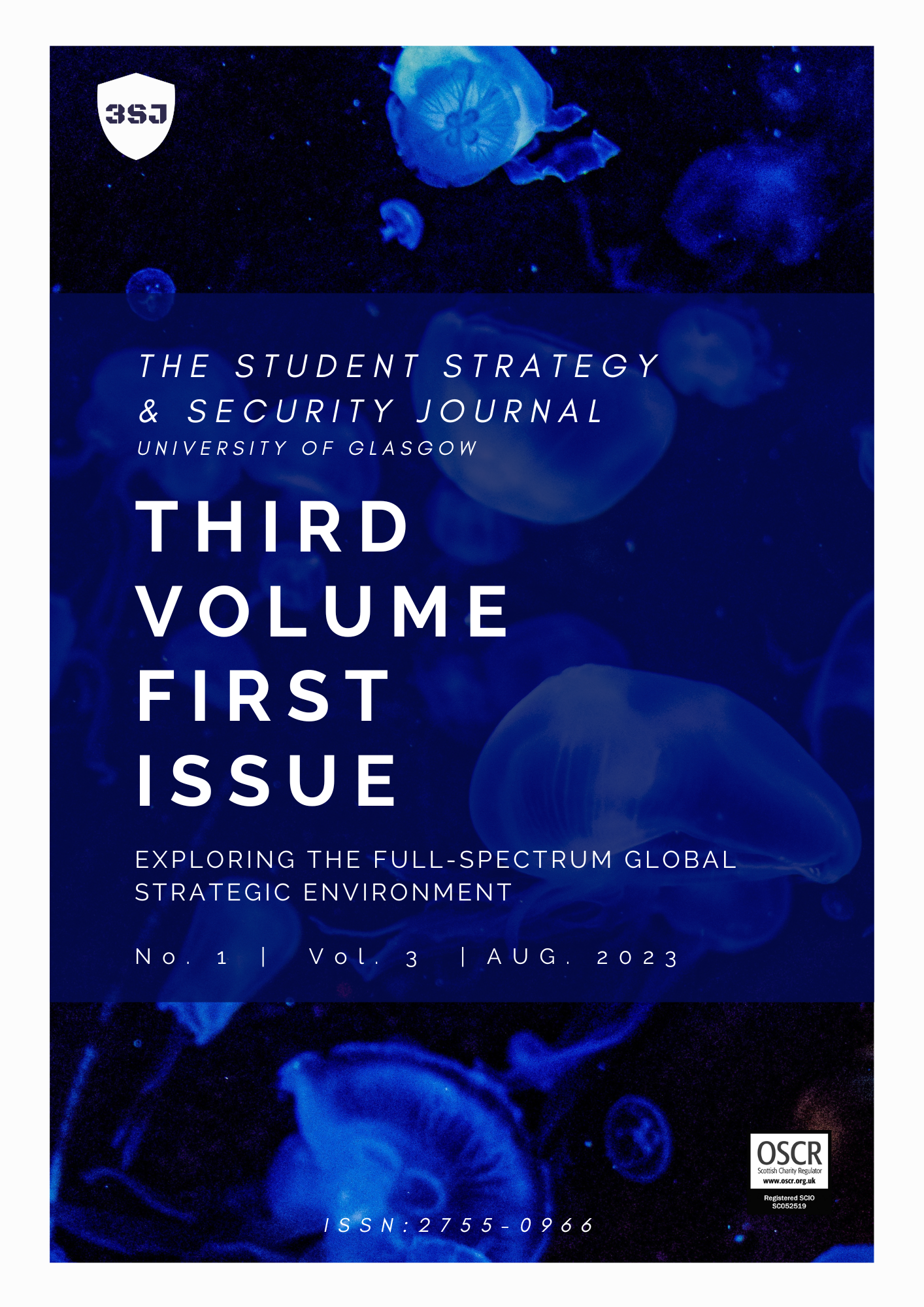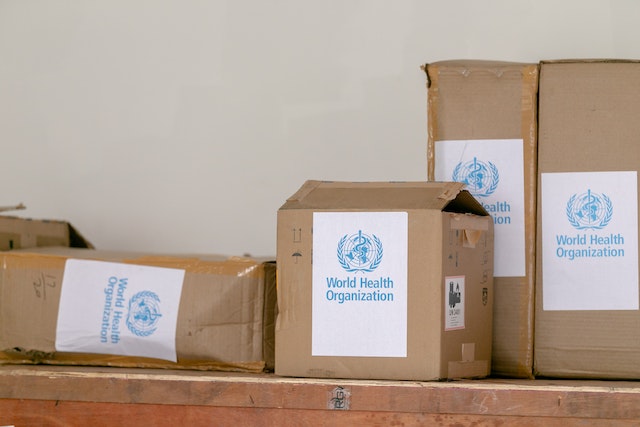FIRST ISSUE
VOL THREEAugust 2023
Third Volume First Issue
The Multiverse we now inhabit and the Rules-Based Liberal International Order that continues to structure it have become increasingly complex, unfathomable, contested, fragile and, for some, dangerously devoid of meaning. This is the guiding thread connecting the eight articles published in the present issue of 3SJ and the three thematic sections they are grouped in. The first three articles discuss the use, misuse and attempts to regulate and tame the myriad cybernetworks that constitute the nervous system of the emerging Metaverse – each at a different level of analysis: international, national, and individual. The following three contributions zero in on cooperative governance in the real world within the context of human security and the threats individuals face from global phenomena such as health pandemics, persisting poverty levels, and environmental degradation, but do so by adopting distinct theoretical lenses: critical feminism, Marxism, and liberal institutionalism. The last two contributions examine shifting Asian dynamics of conflict and cooperation: first, the evolving relationship between Israel and Lebanon, as they recently ratified a landmark agreement settling their shared maritime border; and second, the critical choices facing the Chinese Navy in adopting a Grand strategy that will best enable China to achieve military and political dominance in the vast Indo-Pacific expanse whilst minimizing the risks of a global military confrontation with their great rival, the United States.
Lara Maria Guedes Gonçalves Costa
The United Nations’ contributions to enhance global cybersecurity: an assessment of its regulatory bodies’ successes and challenges
The United Nations (UN) has played a key role in inter-state discussions on cybersecurity in the past years. The UN Group of Governmental Experts (GGE) and the Open-ended Working Group (OEWG) are among the most prominent international regulatory bodies addressing the challenges of emerging and disruptive technologies, calling for state cooperation and a common approach to these issues. This article explores the progress of the GGE and OEWG from their creation to the present and analyses the enduring sources of contention between states in cybersecurity affairs. In particular, it discusses the challenges of applying international law and international humanitarian law to cybersecurity and developing global legal norms. It also analyses the GGE and OEWG reports to evaluate their achievements, shedding light on ongoing cybersecurity efforts and issues at the international level.
Keywords: United Nations; GGE; OEWG; cybersecurity; international law; international humanitarian law; UN Charter.
Elio Brando and Gianmarco Gabriele Marchionna
Strategic digitalization of energy infrastructures: cyber and geo-economic issues
Digitisation is a broad concept that includes implementation approaches such as the Internet of Things (IoT), sectoral applications such as Industry 4.0 and systemic abstraction such as the System of Systems (SoS). The implementation of advanced technologies in the digitization of energy infrastructure is likely to lead to the rapid development of high-tech facilities. However, these advances will also lead to an increase in geo-economic, geopolitical, and cyber risks. This paper addresses the importance of new energy infrastructure and technological advances, focusing on the exposure to risks arising from the cyber domain and its geo-economic and digital implications. The paper provides an overview of the geo-economics of energy transition in the context of strategic digitization, with a governance perspective. Significant features of the energy systems transition are described and a conceptualization of digital technologies is provided. The state-of-the-art of cybersecurity developments in the context of energy security is assessed, focusing on cyber attacks on energy infrastructure and how to counter them through a security governance framework. Finally, the paper outlines the main risk scenarios for building energy governance, highlighting the challenges and issues in addressing the strategic digitization of energy systems.
Keywords: Energy transition; cybersecurity; digitalization; cyber-attack; infrastructure; geopolitics; geoeconomics
Laia Corxet Solé
Incel terrorism: How women’s sexual freedoms put misogynists on the defensive
Misogyny has been increasingly identified as a driving force for terrorism due to recent instances of political violence associated with the involuntary celibate (incel) community. Incel discourses are embedded in an extreme misogynist ideology that provides a framework for understanding the incel experiences and their reality. The present paper explores how this ideology serves as a driver for incel terrorism by identifying the ideological elements present in incel discourse that justify the use of terrorism through a narrative that positions misogynists in a defensive position. It argues that such a misogynist framework allows incels to articulate an unjust grievance against which to struggle by identifying women’s sexual liberation as an attack on the patriarchal system which renders incels unable to perform successful masculinity due to a lack of access to women’s bodies. Additionally, misogynist ideology positions incels as victims of a system that is perceived as unjust, and therefore rationalises a reactionary political struggle through terrorism. While the incel worldview might be unique to the community, identifying the ideological elements of incel discourses positions incels as part of a wider extreme misogynistic ideological milieu, which should be regarded as the source of incel terrorism.
Keywords: Terrorism, incel, misogyny, feminism, sexual liberation
Giuliana T. Iacobucci
Confronting the ‘New Normal’ with Old Norms: Global Cooperation and Health Challenges from a Critical Feminist Perspective in the COVID-19 Era
The objective of this essay is to delve into the impacts of globalization on cooperative governance structures during the COVID-19 pandemic. Using the ontological critical feminist method, this paper addresses that cooperative governance was hindered by the forces of globalization because of the international governance regime’s emphasis on masculine notions of global structures; this emphasis is seen through entrenched hierarchies, neoliberalism, and security in the international system. Critical feminism along with its understanding of globalization are highlighted. Entrenched hierarchies hindered governance during the pandemic, seen through intersectional experiences of racism, upscaling ‘universal’ health solutions applied to the Global South, and the underrepresentation of women. Neoliberalism illuminates a lack of power sharing and voluntary commitment creating a minimal social safety net. Further, neoliberalism creates a ‘fungibility’ of women’s bodies. Issues in the global security regime during COVID-19 minimized the saliency of cooperative governance through masculine structures of state and security in migration, state-centric security within international institutions creating isolationism, and self-sufficiency reinforcing the Global North and South divide. Throughout this paper, the COVID-19 pandemic from the critical feminist lens is viewed as a demonstration of the inherently masculine assumptions and practices in international politics, illuminating perspectives relegated to the sidelines. By delving into the nuances of global governance from the critical feminist perspective, viewpoints that are hidden because of the intersections of power within the global system will allow the field of international relations to better understand how crises are weathered differently. This allows for the diagnosis of divergences in the global hierarchy, which can create equitable solutions for future crises.
Keywords: COVID-19, critical feminism, intersectionality, neoliberalism, Global North /South divide.
Wren Taylor
Prioritizing Wealth over Health: The Covid-19 Vaccine Strategy
This article demonstrates the link between inadequate international cooperation and global health inequalities in COVID-19 vaccine distribution within the context of neoliberal globalization. This is accomplished using Immanuel Wallerstein’s World Systems Approach as a framework to critique unequal vaccine distribution between the periphery and core states of historical capitalism as the units of analysis. The paper claims that the embedded market interests within globalization have furthered inequality within the already vulnerable states of the Global South by hindering cooperative international governance on vaccine strategy. First, neoliberal globalization is defined in relation to the vulnerabilities it has created in the Global South, both within and above the level of the state. Next, the examples of intellectual property rights (TRIPS) and public-private partnerships (COVAX) are highlighted as examples of institutional barriers to global cooperation on vaccine strategy. Instead of globalization providing a means for international cooperation, the pandemic facilitated opportunities for mega corporations, marketization, and high-income countries (HICs) to economically exploit the disadvantaged populations in the underdeveloped world by withholding essential biotechnology through international policies that prioritize wealth over health. Finally, the paper explores how these barriers have instead upheld the polarizing processes of vaccine nationalism in the developed Western societies.
Keywords: COVID-19, World-Systems Approach, vaccine strategy, TRIPS, COVAX, vaccine nationalism
Fred R. Simonyi
An Unhealthy Pairing: How Globalization and Neoliberalism Have Impacted Global Health Governance
In recent decades, globalization and neoliberalism have worked in tandem to utterly change the landscape of global health governance. Nations worldwide have engaged in unprecedented levels of cooperation on healthcare issues, with a new neoliberal focus on improving health for the sake of the global economy. However, an examination of the state of global health reveals the diverse, enduring problems with the current neoliberal lens of globalization. This paper finds that while increased levels of globalization have allowed international organizations to positively impact the state of global health, the dominance of neoliberalism in these organizations has limited their positive effects, sometimes causing explicit harm. Organizational efforts to tackle health-related challenges regarding infectious disease control, environmental degradation, and poverty have failed to see major success on a global scale due to the neoliberal policies promoted by international organizations. This paper contends that the state of global health could see major improvements if international organizations shifted away from their strict neoliberal policies in favour of a more inclusive and equity-driven approach. This would allow for a greater emphasis on long-neglected goals of global health governance such as sustainability, reduced inequality, and global fairness.
Keywords: Health, neoliberalism, globalization, World Health Organization, poverty, environment, infectious diseases
Eva Hager
The Israeli-Lebanese Maritime Border Deal for Energy Security: A Liberal Internationalist Perspective on Conflict Resolution in the Eastern Mediterranean
Over the past decades, the relationship between the State of Israel and the Republic of Lebanon has been far from peaceful, with occasional disputes, and even wars, between the two nations. Most recently, the disagreement about the location of their common maritime border in the Eastern Mediterranean has been the centre of conflict between the neighbouring countries. The disputed territory of 860 km² contains natural hydrocarbon resources in the form of gas and oil, which both countries hope to make use of to improve their respective economic situations. In the present paper, the international relations theory of liberal internationalism is applied to further examine Lebanon’s and Israel’s motives in the matter. The signing of their maritime border deal on October 27th, 2022, is an example of conflict resolution in the spirit of liberalism: conflict resolution through negotiation, cooperation and interdependence, without the use of military force. Furthermore, the paper explains that a critical additional factor surfaced, making the agreement possible. In a quickly changing geo-strategic environment for both countries, achieving increased energy security and exporting natural gas suddenly became not only possible, but progressively probable. The results are, among other benefits, mutual economic advantage, a better basis for long-lasting peace and prosperity, as well as stability in the region. The agreement, brokered by third-party negotiators, represents a significant breakthrough in the shared history between the two countries, which might pave the way towards a stronger relationship in the years to come.
Keywords: Liberal internationalism, energy security, conflict resolution, Israel, Lebanon
Jack Mallinson
Following the Principles: Why The Chinese PLAN Should Adhere to Corbett’s Strategy Instead of Mahan’s Precepts
Many scholars in the field of Chinese security assert that the People’s Liberation Army Navy’s (PLAN) adheres to the offensive, expansionist naval strategy of Alfred Thayer Mahan. However, by analysing the current strategic and operational capacities of the PLAN, this essay argues that the PLAN ought to adhere instead to the teachings of Mahan’s intellectual opposite, Sir Julian Corbett. By critiquing Corbett’s Principles of Maritime Strategy, this essay will illustrate that Corbettian strategic thought would better serve the PLAN at both the strategic and operational levels. Strategically, adherence to Corbett aligns with the pre-existing ‘Active Defence’ doctrine of the PLAN and would better protect the Maritime Silk Road (MSR) project than would a Mahanist approach. Moreover, at an operational level, the teachings of Corbett align significantly with the PLAN’s A2/AD capacity in the China Sea. Corbettian principles would prove vital in the event of a Taiwan contingency, an avowed goal of the Chinese Communist Party for accomplishment within the next two decades.
Keywords: Corbett, Mahan, Indo-Pacific, Active Defence, Naval Strategy, PLAN, SLOC, A2/AD
Contact us
Become a contributor









